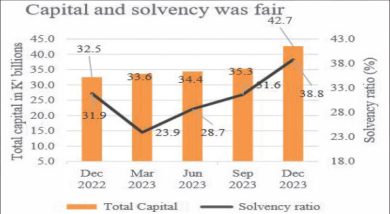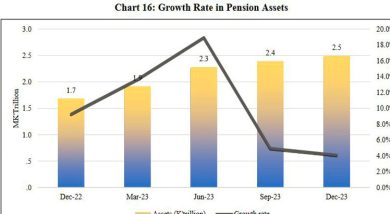What happened there can happen here
On the front cover of The Economist dated March 2 to 8 2013 the heading is “Aspiring Africa.” For a change, the special report on Africa is mostly positive. We read of a new Africa that is growing faster than any developing region of the world. Some countries in Africa’s six regions are given special prominence.
Must Africans start celebrating now that the outside world is giving them a different attention, no longer as a continent of endemic civil wars, corrupt regimes and thieving dictatorships? Modest celebration is all that can be encouraged here.
The Bible now and again, tells how calamities came about such as the floods in the time of Noah, conflagration of Sodom in the time of Abraham and Lot. These disasters came when people were engaging in orgies, luxuries, homosexuality and when they forgot the overall ruler of the universe, the Creator.
The modern world is still subject to natural disasters such as floods, tsunamis, famines and wars. What other climatic changes we will experience, our scientists have not told us. But when trading nations of the world seem to be heading for greater success in accumulating wealth, a business cycle descends on them from somewhere.
In place of full employment, widespread unemployment grips economies, giant firms get bankrupt and there are riots for food and against austerity measures. In recent years, this downturn took place among the Asian economic Tigers, South Korea, Hong Kong, Thailand, Singapore and Taiwan. In 2007 and 2008, the leading economies of North America and Europe experienced a financial melt-down that would have been as the Great Depression of the 1930s if not for timely concerted action by the affected governments.
Are there causes that were common to these episodes from which we can learn lessons, to ensure that the worst that happened there should not happen to the emerging African economies?
As soon as the Asian economic crisis occurred, The Economist detailed members of its staff to study and identify what might have been the cause. In one of the articles reproduced in an anthology headed ‘Economics, making sense of the modern economy’ we read:
“Across the region, expectations about future growth became extravagant and capital became cheap, encouraging over-borrowing. Much of the money was squandered on speculative property investment or the overexpansion of industrial capacity. At the same time, fatal combination of pegged exchange rates and an over hasty opening of economies to short-term foreign capital caused a surge in debt to foreign banks. The resulting financial bubbles were inflated further by inadequate bank regulations and the close, sometimes corrupt relationship between banks, firms and governments which encouraged borrowers and lenders to believe that governments would bail them out if need be.”
A common fault in the two crises was cheap credit, which encouraged speculative bidding. Entrepreneurs borrowed capital and invested in property development, built houses for a dim future. There was an oversupply of houses and rents fell, while some buildings found no tenants. Borrowers could not repay the loans. The negative multiplier effects followed.
African countries are now being visited by fortune hunters from other continents that have realised that their investments earn more profits in Africa than in other continents. Very likely, those who used to lend their short-term capital to the Far East countries will also tempt Africans to ask for such loans. Every chunk of dollars a country borrows should have reliable collateral.
Some people within the same country capture governments. They form strong pressure groups and force governments to make concessions to them without offering extra productivity or production in return. Economists who have written on the Greek crisis talk of the days the governments had to succumb to such interest groups as teachers and farmers. When a government borrows money, whether from local lenders or foreign ones, it is on the way to being heavily indebted. Once lenders realise they are not going to get back their money, they start panicking.
There must be vigilant bodies in a country to interpret indicators. When the ratio of the current account deficit is too big compared with foreign reserves, it is time to make use of the bridle.
Capital is awash in Middle East countries. That is good for Africa. But let us not borrow beyond our ability to repay.





